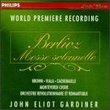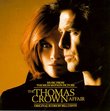| All Artists: Gustav Mahler, Claudio Abbado, Berlin Philharmonic Orchestra Title: Mahler: Symphony No. 6 Members Wishing: 0 Total Copies: 0 Label: Archiv Produktion Release Date: 6/14/2005 Genres: Special Interest, Classical Style: Symphonies Number of Discs: 1 SwapaCD Credits: 1 UPC: 028947755739 |
Search - Gustav Mahler, Claudio Abbado, Berlin Philharmonic Orchestra :: Mahler: Symphony No. 6
 | Gustav Mahler, Claudio Abbado, Berlin Philharmonic Orchestra Mahler: Symphony No. 6 Genres: Special Interest, Classical
Abbado continues his Mahler cycle with this fine Sixth, a live recording that Mahlerians will want for its forwarding-moving flow reminiscent of Kubelik's excellent recordings of the work. Abbado is especially fine in the ... more » |
Larger Image |
CD DetailsSynopsis
Amazon.com Abbado continues his Mahler cycle with this fine Sixth, a live recording that Mahlerians will want for its forwarding-moving flow reminiscent of Kubelik's excellent recordings of the work. Abbado is especially fine in the Andante, here placed before the Scherzo, unlike his first, 1970s recording with the Chicago Symphony. His refusal to linger and his molding of the Andante's melodic lines make it one of the best available recordings of this section of the massive work. The Berlin strings shine here, as they do throughout the Symphony; only the lower brass disappoint somewhat as they sound a bit lightweight when compared with Chailly's Concertgebouw Orchestra. Many will prefer Bernstein's more-overt emotionalism, but the famous hammer blows in the last movement have tremendous impact. Like many other conductors Abbado omits the third blow (which Mahler eliminated in his editing of the first version of the piece). In fact, that last movement is one of the set's highlights, well-played and abundantly detailed. In sum, one of the better Sixths in the catalogue. --Dan Davis Similarly Requested CDs
|
CD ReviewsAbbado or Karajan in the Mahler Sixth? Santa Fe Listener | Santa Fe, NM USA | 01/03/2006 (5 out of 5 stars) "The Berlin Phil. competes with itself in two masterful readings of the Mahler Sixth, one with Karajan (studio, 1978), the other with Abbado a quarter century later (live, 2004). My copy of the Karajan gives no recording data, but I imagine it was made in the Philharmonie, like Abbado's. It's fascinating to cmpare the two, not that most Mahler devotees won't buy both. Orchestra: As evidenced here, Abbado has brought about a transformation of the BPO into a lighter, more spontaneous- soudning ensemble that abandons Karajan's famously plush string sonority. In the Sixth Karajan's orchestra sounds more forceful, they dig into phrases, and the overall impression is one of tremendous power. There's no doubt, however, that both incarnations are supremely virtuosic. Sonics: Karajan's Sixth is miked very closely-- right next to the conductor, more or less--which gives the sound tremendous impact, while at the same time there is a good deal of hall reverberation, so we don't feel suffocated. Abbado's recorded sound is mid-hall but very detailed and natural. Distance reduces the thunder of the great climaxes compared to the earlier set, yet in compensation the tension isn't so nerve-wracking. Tempos: Surprisingly, in every movement but the Andante both conductors choose the same tempos within a few seconds. The fact that Abbado's Andante takes 12 min. as opposed to Karajan's 17 min. makes the difference between fitting the symphony on one CD instead of two. In the first movement's opening march, both conductors follow Mahler's direction of Allegro energico--in fact they are a minute faster than Bernstein's quick 23 min. with the Vienna Phil. in his famous DG recording. Interpretation: Karajan is altogether more intense, searches deeper, and more starkly underlines the shockwaves given off by the score. Abbado opens almost serenely and keeps an even flow, never leaning into the anguished upheavels--his fast Andante is a carefree song compared to Karajan's poignant elegy building deliberately until it reaches an impassioned outburst. Neither tries for the ultimate anguish of Bernstein's finale, and it's here that Abbado outdoes Karajan. Having saved himself for this climactic eruption, he gives us more contrast with the rest of the symphony. Overall, this doesn't come down to a consumer choice. These two sets provide a great musical experience, each in its own right. But I would guess that Karajan, having lasted on top for almost thirty years, will continue to dominate a while longer." Optimism amidst tragedy by Abbado Larry VanDeSande | Mason, Michigan United States | 11/03/2005 (4 out of 5 stars) "Claudio Abbado is the dean of European conductor and is in his third generation of Mahler symphony recordings. They have been praised since his first renditions three decades back. This recording with the Berlin Philharmonic, where Abbado was music director for more than a decade after Karajan's death, is taken from a concert in 2004. Everything in this version of his Mahler "Tragic" symphony builds on his reputation as a Mahler expert that understands both the written score and message of the music. In this case Abbado's message is clearly optimistic, not tragic. Always one to adjust tempo to meet his needs, Abbado does so in the opening march where, at 11:15, he begins a slowdown that lasts about 30 seconds until the main theme carries it away. He repeats this technique at 19:10 with the same later result. This is Abbado as we have known him since his benchmark recordings of symphonies by Tchaikovsky, Mendelssohn and Brahms in the 1970s. Abbado switches the second and third movements -- and asks for your forgiveness for doing that in his notes -- in a pattern conductors have returned to in recent years. As Abbado suggests in his notes, Mahler approved this format in the first practices for the symphony. A recent recording under the baton of Charles Mackerras circulated by BBC Music Magazine also used the adagio as the second movement and the scherzo number three. Abbado's adagio is exceptionally passionate without being overwrought, like what we hear in Tilson Thomas's recording of the Sixth Symphony. Following closely to the pattern developed in Karajan's famous recording, Abbado sees the adagio as the heart of this music with the finale being its soul. In the finale Abbado emphasizes the inherent search for optimism. "(T)ime and time again the music rises to huge climaxes in pursuit of triumph," Abbado says in the notes, "only to encournter defeat in the famous hammer-blows." Abbado's version includes three hammer-blows, the final blow coming at the end of the symphony and signifying the death of Mahler's hero. Yet, all throughtout, the conductor moves cautiously through the tragic soul of the music by emphasizing the brighter moments and the optimism the hero sees before being felled by timpani hammer-blows (I've heard them delivered by a hammer on anvil in recordings and performances.) While Abbado ends the symphony with the traditional third hammer-blow, it does little to extinguish the light of optimism that existed during most of the 30-minute span. The recording, made in the Philharmonie in Berlin, is truthful and honest with good depth but short on brilliance. You hear everything as you would in a good seat in the concert hall but without the brilliance you hear on the best recordings of this music. I think Abbado's version compares very will with the Grammy winner recorded by Tilson Thomas. Abbado has plenty of passion for the music without MTT's echt-Bernstein overindulgence. The recording pales beside the brilliant BBC recording for Mackerras, another concert recording from 2002. Other recordings I've heard of this music -- straightforward deliveries by Abravanel and Neumann and Karajan's two-CD version that is beloved by British critics including Gramophone magazine and the Penguin Guide -- do not seem to put everything together as well as this one. I prefer the sound and urgency of the Mackerras recording and will likely listen to this one when I want an optimistic perspective on the Mahler "Tragic" symphony." Marvelous recording by a truly great conductor RaabH | USA | 06/20/2005 (5 out of 5 stars) "When I saw that this new recording of Mahler's Sixth was available I questioned whether I needed yet another for my collection. Eventually, though, since so much of Abbado's work lately has been quite special, my curiosity got the best of me.
I'm very glad it did. This immediately wins a place amongst my favorite performances of this symphony, alongside the ones that I've found most rewarding in the past: Chailly, Bernstein (DG), and Barbirolli (the latter indeed for something completely different!) Abbado's tempos seem perfectly judged. This is no "elder statesman's" view of the work -- the rhythms are robust and strong while the lyrical episodes are achingly beautiful without getting pulled out of shape. Overriding Abbado's interpretation is a sense of certainty and forward thrust. As episodic as this work can sound in less capable hands, with Abbado the changes in mood sound inevitable and true. He knows what he wants to say and the BPO is right in there for him, delivering in full. Like nearly every conductor who has recorded this symphony, Abbado goes for two hammer blows in the final movement. Their impact is visceral, certainly delivering the dreadful thwack of fate that Mahler intended. Having heard the first one, I came to anticipate the second with a thrilling sense of trepidation. For a moment I wished that Abbado had gone against Mahler's wishes and included the third. Abbado places the Andante movement second and the Scherzo third. I prefer the movements in the opposite order, but of course with CD technology anyone who agrees with me on that is easily accommodated. The sound quality on the stereo version is excellent -- not too glossy or over-engineered, allowing instrumental detail to emerge naturally. I can't comment on the SACD, but if I ever get suitable equipment then this performance will be amongst the first in that format that I'll acquire. For a beginning Mahler collector this is certainly a wonderful Sixth, but for a life-long devotee this recording will bring many great rewards as well. Fellow Mahler fans need not hesitate, even if other Sixths crowd your shelves." |

 Track Listings (5) - Disc #1
Track Listings (5) - Disc #1








